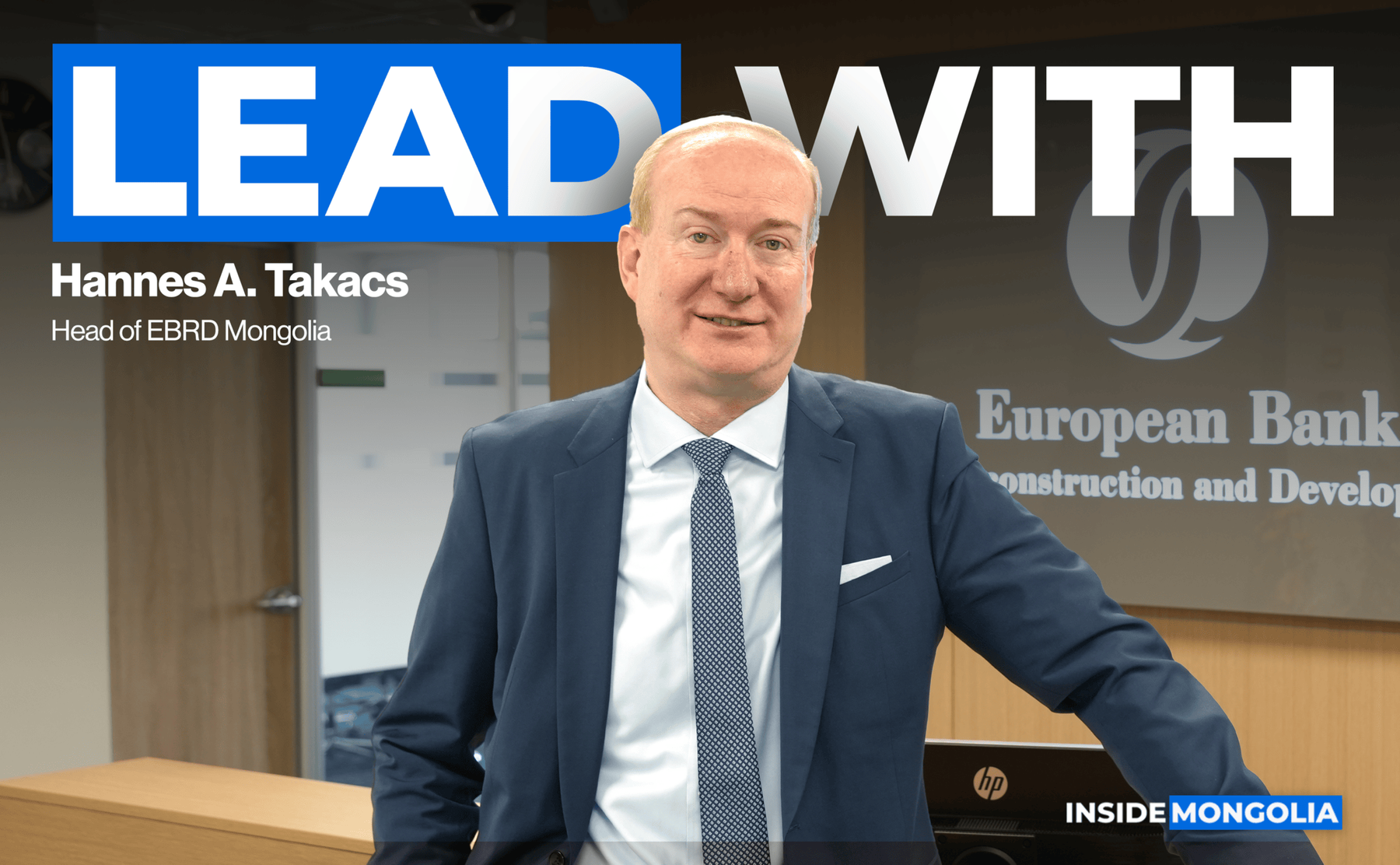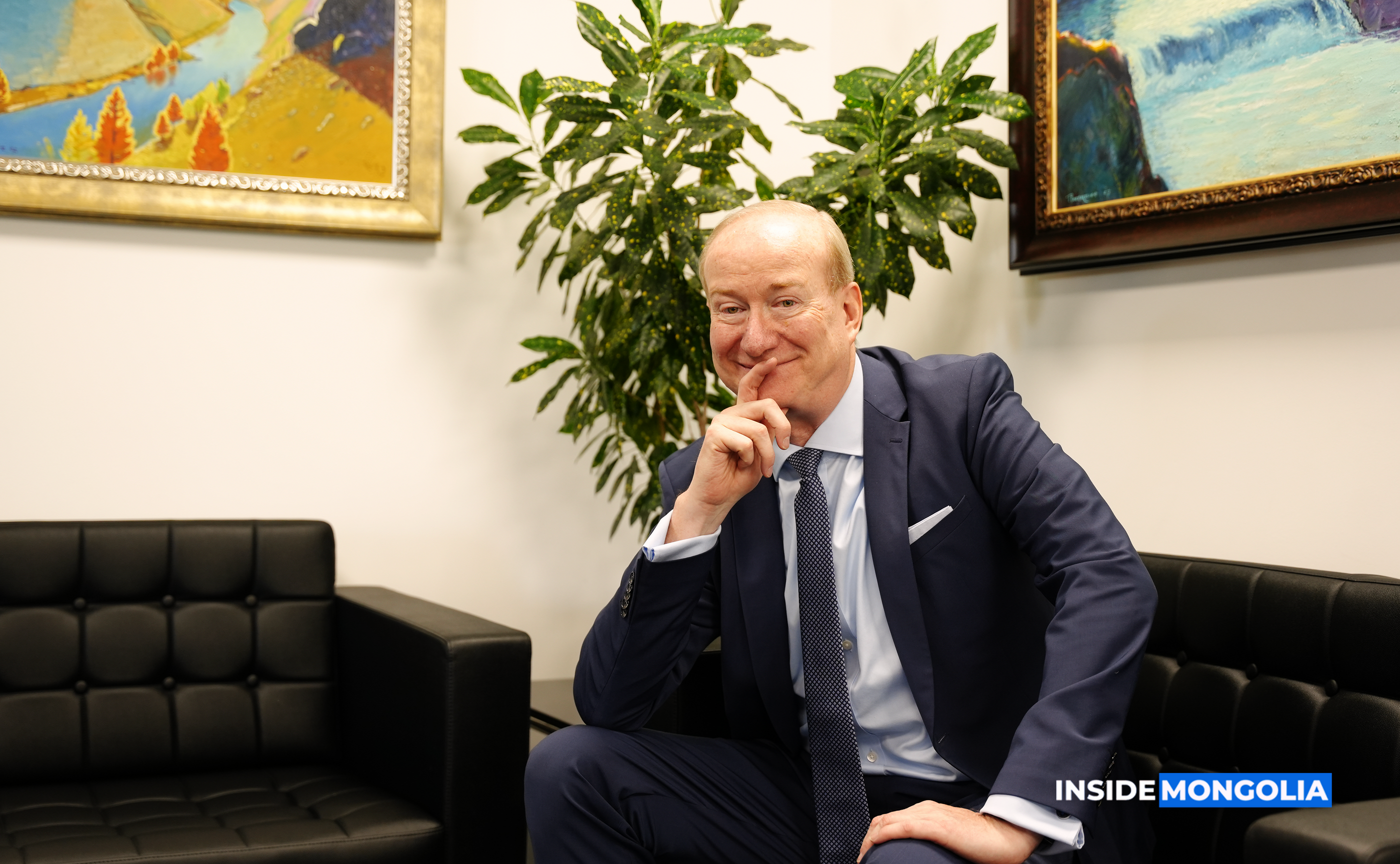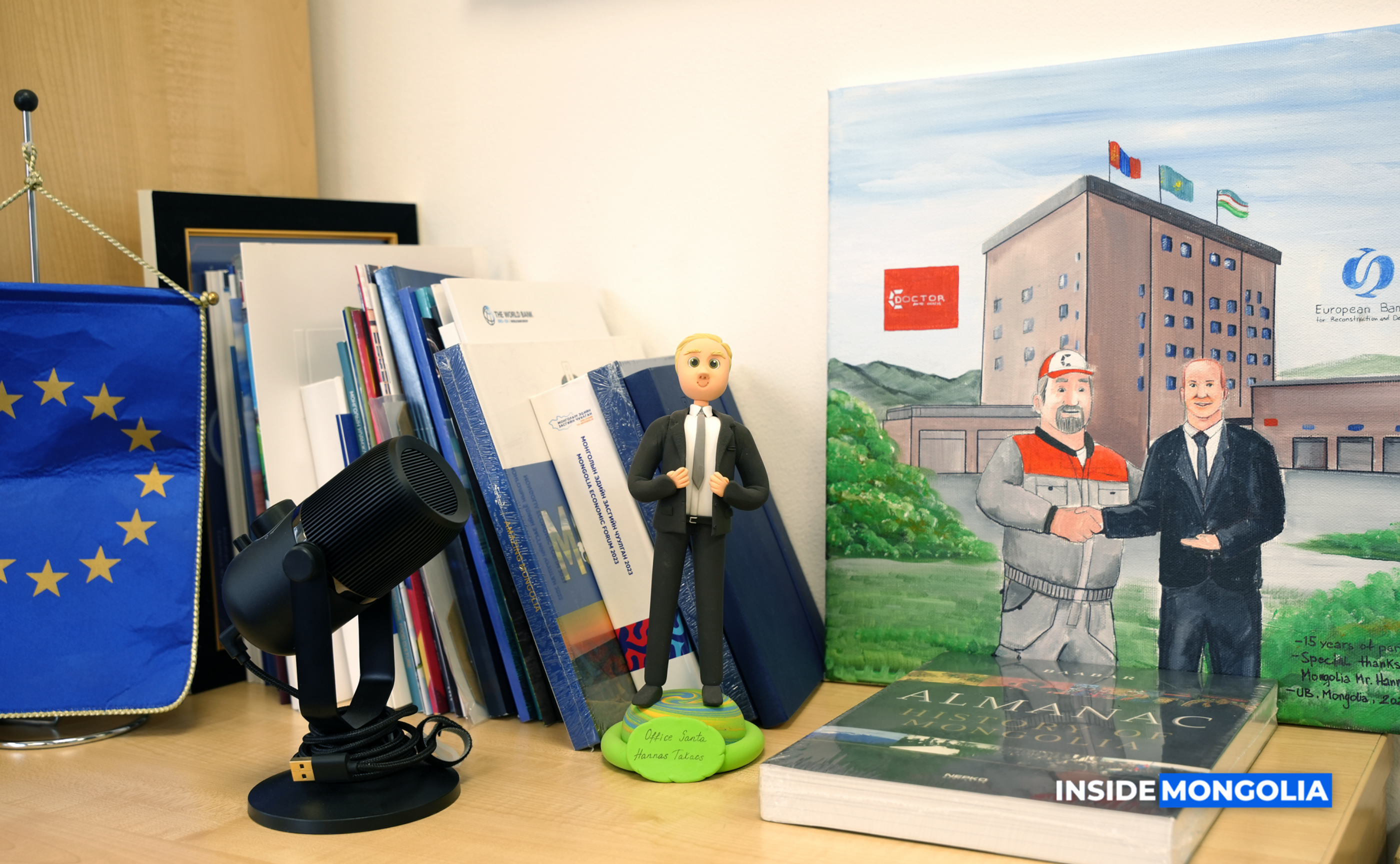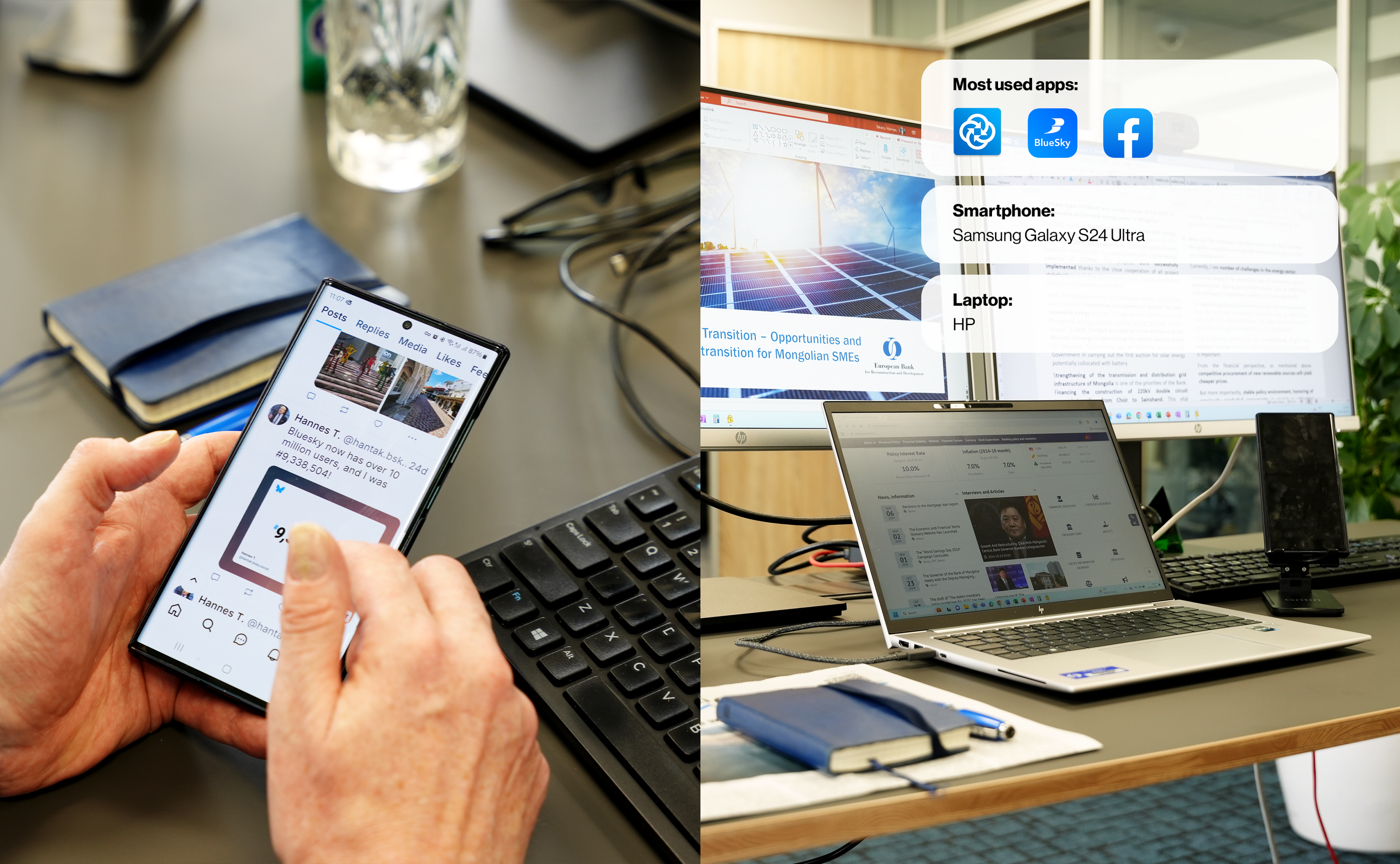Khulan M.
/ December 2, 2024
Hannes A. Takacs: Leadership Requires Loyalty to Your Team

Welcome to the third edition of Lead W/ by Inside Mongolia! This time, we’re thrilled to walk you through the journey and leadership philosophy of Mr. Hannes A. Takacs, Head of EBRD in Mongolia. Dive into the insights behind his visionary approach, his commitment to positive change, and how his rich experiences have shaped his impactful leadership style.

Mr. Hannes A. Takacs is a visionary leader whose career reflects a powerful mix of entrepreneurial spirit, financial expertise, and a dedication to social impact. From launching his own companies to guiding capital market development for 54 countries, he has continuously pursued innovation and positive change. We’re excited to share his remarkable journey, insights, and inspiring philosophy that has shaped both his professional path and the communities he supports.

- Bachelor at Vienna University of Economics and Business, Austria
- MBA at the University of Leicester, UK

- Founder of Fox Consul
- Director at the Vienna Stock Exchange
- Head of EBRD Mongolia

Could you describe your leadership style and philosophy, with specific examples?
My leadership style was shaped by my early training in Sweden. I believe in involving everyone on the team and live by the motto, “Everybody has a talent—you just need to find it.” Some team members, especially introverts, may not immediately express their abilities, so I prioritize one-on-one conversations to uncover their strengths and aspirations.
I’m not a micro-manager. Instead, I focus on providing direction while giving people room to grow. My team’s results speak for themselves—we’ve expanded our business significantly, managing a $1 billion portfolio, 80% of which is in the private sector. I’m fortunate to work with an exceptional team in Mongolia, and I strongly believe in teamwork and career coaching.
Regular one-on-one meetings are central to my approach. I check in with every team member at least monthly, discussing not just business but also personal challenges, as they often affect work. This helps me provide support where it’s needed most.
My leadership philosophy stems from the lessons my father, a foster child, taught me: People are life’s most important asset. He encouraged us to take summer jobs to learn about life’s challenges. I worked in factories and as a lift operator, experiences that reinforced the importance of equality and creating opportunities for everyone to grow.
I was fortunate to benefit from Austria’s free education and healthcare systems, but ultimately, success is about making the most of available support while being mindful of those less fortunate. A leader with vision must also foster an environment where everyone can succeed.

Could you share a memorable leadership experience that shaped your approach?
Leadership often requires difficult conversations, such as informing someone that their performance is inadequate or that they aren’t fitting into a team. Thankfully, I haven’t faced such challenges here in Mongolia, but I’ve dealt with them extensively in my own companies. These situations are tough because people interpret every word differently.
At the time, I introduced an approach similar to an outsourcing service, where we worked to find alternative positions for those affected in other companies. Communicating this was incredibly challenging, especially during tough times. Effective communication during good times is easy, but it becomes exponentially harder during difficult periods. That’s when a leader must emphasize that everyone is in the same boat, striving toward a shared goal to overcome adversity.
One defining moment for me was steering my company through the Lehman Brothers crisis without major setbacks. It was a steep learning curve filled with many sleepless nights, but it reinforced the importance of clear and empathetic communication.
Do you have any specific advice or a 'hack' for handling such situations?
There’s no universal hack—it largely depends on your personality and communication style. Some leaders prefer quick, directive communication without much discussion, but I believe in balancing decisiveness with context. For example, in personal relationships, if someone ends things, you’d want to understand why. Work relationships are no different; you can’t just tell someone they’re not fit—you need to explain why. It’s crucial to address issues as soon as they arise. Early and transparent communication about areas for improvement can prevent surprises later. This approach also allows for collaborative problem-solving. I’ve learned that frankness, politeness, and offering clear solutions are vital. Transparency is key—especially in Mongolia, where everyone knows everyone, and secrets are hard to keep. In fact, this applies universally, even in larger countries.
For me, transparency is a cornerstone of leadership. It builds trust and ensures that everyone is on the same page, whether during good times or bad.

What are the 3 key highlights from your career journey?
1️⃣ While still a student, I co-founded my first company with 2 university colleagues, focusing on futures and options. This hands-on experience in advising clients across Austria and Southeastern Europe proved far more enriching than traditional academics. It taught me the essence of problem-solving and practical application, which books alone cannot convey.
2️⃣ In 2008 and 2009, I first connected with Mongolia through my work on emerging market financial development. This initial visit ignited a lasting commitment, culminating in my role at the EBRD in 2013. Working globally, especially in a country like Mongolia, feels like home because of its warm, honest people, exceptional team, and supportive social environment.
3️⃣ My wife and I spent a decade in London, where her work kept drawing us back. It was interesting to see how perceptions shifted: when I said we were heading “back home,” friends assumed it meant London, but we were actually returning to Mongolia. Choosing a place to live and work must be about more than just professional satisfaction; it should feel like home. For me, that means having an exceptional team and a trusted social circle. During the COVID pandemic, the strong bonds with Mongolians reinforced our sense of belonging and fulfillment.
What was your most impactful investment in personal growth, and how did it shape your path?
Without a doubt, my time. I prioritize lifelong learning, dedicating weekends to reading at least one book per month and enrolling in courses—recently on the circular economy. Continuous learning keeps me engaged, informed, and adaptive.
In monetary terms, I’ve made impactful investments that go beyond financial returns. My team and I actively support community initiatives and NGOs. For example, we matched up to €50,000 in donations for various causes over the past three years. One particularly moving experience was raising €100,000 for a Heart Foundation supporting children affected by air pollution in Mongolia. Witnessing the incredible work of a doctor performing life-saving surgeries for children, including those from neighboring Central Asian countries, was unforgettable.
Another inspiring initiative involved supporting Mongolia’s Special Olympics team. Meeting an athlete who walked over an hour to train due to a lack of bus connections reinforced the profound impact of investing in people and their aspirations. These experiences have been deeply fulfilling and continue to shape how I view meaningful investments.

What is the most essential quality for a leader, and how has it influenced your career?
Having the right vision and effectively communicating it to the team. A clear vision ensures everyone understands the direction and their role in achieving it. Leadership also requires loyalty to your team. Mistakes happen, but it’s crucial to analyze decisions and adapt to changing circumstances. Building trust within your team is essential to maintaining high performance.
What is your perspective on the concept of work-life balance?
Work-life balance is a nuanced and personal concept, and my perspective on it has evolved over time. When I began my career, I was working 50 to 60 hours a week, but it never felt burdensome because I was genuinely passionate about what I was doing. For me, work wasn't a source of stress; it seamlessly integrated into my life as something that I enjoyed. When you’re engaged in work that excites and fulfills you, the lines between work and life tend to blur in a healthy way. Passion can make long hours feel less like a sacrifice and more like a natural part of your routine.
I've seen this mindset reflected in startup cultures, where employees often don’t track their hours because they are so committed and passionate about their work that it feels energizing rather than draining. However, I do recognize that this dynamic shifts, especially for those who have families. For young parents, achieving a true balance between work and personal life is crucial because being present for family moments, such as watching children grow, becomes more significant.
In our organization, we support work-life balance through flexible structures, such as remote work. This practice has shown that productivity doesn’t suffer; in fact, it often improves. Studies have confirmed that having the flexibility to recharge can enhance performance, and our experience reflects this. The misconception that remote work leads to laziness is just that—a misconception. What truly matters is not the number of hours worked, but the quality and impact of the output.

Can you walk me through how you structure your workday?
My daily work routine is probably not the best example of work-life balance, especially with our headquarters in London and the eight-hour time difference. For instance, just yesterday, I was in online meetings until 11 p.m., and the night before until 9 p.m. I usually wake up around 7 a.m. and kickstart my day with an espresso macchiato—my beloved morning ritual, as I'm quite a coffee enthusiast. My mornings often begin with meetings or breakfast discussions, starting between 8 and 8:30 a.m.
We hold team meetings every Wednesday and keep an open-door policy, ensuring regular touchpoints with colleagues. The challenge comes when my schedule becomes overloaded with meetings, leading to additional hours spent on reports and follow-ups. Despite the demanding hours, what really keeps me going is that I genuinely enjoy what I do. It doesn't feel like a burden, even if it means having video calls on the weekend.
That said, I make a conscious effort to disconnect during my time off. I try to keep weekends sacred for family and relaxation, only responding to work emails if there’s something truly urgent. It’s a balance I strive for, making sure I carve out moments to recharge and prioritize personal time when I can.

How many team members do you currently manage? 26 members in total.

Who or what has had the most significant influence on your success?
The greatest influence on my success has been definitely my parents. My brother and I were fortunate to grow up with supportive, caring parents who encouraged us to pursue what we loved while emphasizing kindness and respect over achievements.
Our family was deeply people-oriented, and my parents instilled that spirit in us early. Though they’ve both passed away, their teachings remain a guiding force. One thing I cherished was how they involved us in decisions, even as children, whether it was about buying a car or other choices. It taught us confidence, critical thinking, and that our voices mattered—lessons that continue to shape my approach to collaboration and leadership today.

How has your work know-how influenced your career and created new opportunities?
My work know-how has shaped my career through valuable lessons in consensus-building, cultural adaptability, and leadership. Starting a company with colleagues taught me the importance of finding a win-win approach where everyone feels involved, even in challenging decision-making processes. This was a steep learning curve but one that fundamentally shaped my collaborative skills.
Another pivotal moment came during my time in Sweden, where I experienced open leadership firsthand. The company I worked for encouraged open-door policies, even for the CEO, which was strikingly different from the hierarchical culture I had experienced in Austria. This exposure profoundly influenced my leadership style and my belief in accessible and inclusive decision-making.
However, I’ve also faced challenges, particularly when adapting my leadership style across cultures. For example, in Southeast Asia, I learned the importance of understanding cultural nuances like indirect communication to avoid misunderstandings. Intercultural training helped me navigate these complexities, emphasizing the need to respect and adapt to local customs as a guest in any country.
In Mongolia, where communication is often more straightforward, I’ve found a sense of clarity and connection. My first Mongolian friends during COVID helped me integrate and gave me the feeling of being at home, reinforcing the importance of mutual respect and cultural immersion in every professional journey.
What advice would you offer for managing a successful career, especially for young people?
Trusting yourself is fundamental for a successful career. Regardless of your degree, you’re always competing with talented peers. Confidence, however, should be paired with humility and a recognition that growth is a lifelong endeavor. Both technical skills and, crucially, soft skills are vital. Soft skills shape first impressions—those initial 30 seconds are pivotal, and from there, you have the rest of the interaction to reinforce or change that perception.
Self-awareness is key. Know your strengths and be honest about your weaknesses. For instance, I tend to be impatient, but I strive to understand the reasoning behind slower processes, which is an area I work on. Recognizing and addressing such traits helps you present yourself authentically and evolve.
Career success also hinges on luck—meeting the right person at the right time can be transformative. This is why mentorship and coaching are indispensable; they help you manage expectations and navigate career challenges effectively. Promotions take time, and realistic expectations from both you and your leaders are essential.
Networking isn’t just beneficial; it’s necessary for long-term career growth. Support from peers and mentors can open doors and provide guidance. Additionally, continuous training is invaluable. I’ve found programs like Inside particularly impactful for understanding one’s personality traits, which can shape how you work and how you’re managed.
Finally, it’s vital to assess potential employers just as they assess you. A job should align with your goals, values, and the kind of leadership you thrive under. The right fit can make all the difference in your career satisfaction and trajectory

Where do you typically source your daily information?
- Financial Times
- The Economist platform,
- UB Post
- Inside Mongolia
Your go-to book & podcast recommendation?
I tend to use the internet for information, but three books stand out:
Rarely. I prefer reading books—it’s more traditional but satisfying. One podcast I found interesting was Hula’s on mental health.
Comment